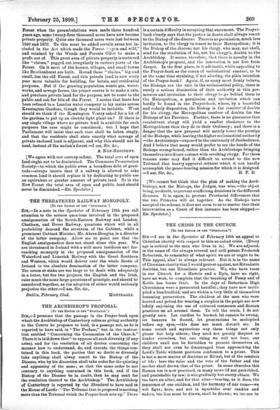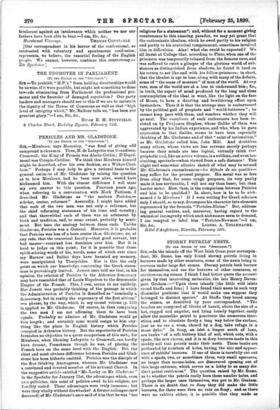• THE CRISIS IN THE CHURCH.
(To THE EDITOR 01 THE "SPICTATOR."] SIR —I see in the Spectator of February 18th an appeal to Christian charity with respect to this so-called crisis. (Every age is critical to the man who lives in IL) We are adjured, in the name of the always revered and still potent Frederick Robertson, to remember of what spirit we are or ought to be. This appeal, alas ! is always relevant. But it is in the name of Christian charity that I would protest against, not Ritualistic doctrine, but one Ritualistic practice. We, who have room in our Church for a Haweis and a Ryle, have no right, have no wish, to complain that the teaching of Pusey and of Keble has borne fruit. In the days of Robertson High Churchmen were a persecuted handful ; they have now multi- plied a hundredfold, and are within a very little of themselves becoming persecutors. The children of the men who were hooted and pelted for wearing a surplice in the pulpit are now loftily enjoining the use of coloured vestments and Roman practices on all around them. To tell the truth, I do not greatly care. Let candles be burned, let censers be swung, let banners be floated, let prostrations be multiplied before my eyes,—this does not much disturb me. In some occult and mysterious way, these things not only please but help others ; they need not greatly disquiet or hinder ourselves, but one thing we will not bear, our children shall not be forbidden to present themselves at, they shall not even be discouraged from approaching the Lord's Table without previous confession to a priest. This is not a mere matter of doctrine or Ritual, but of the conduct of life ; here the voice and the veto of the father and the mother shall drown that of the priest. In some churches this Roman use is now practised, in many more (if not prohibited, and punishable by law) it will gradually but surely obtain. We too have an altar, and for that altar—bearing, as it does, the innocence of our children, and the harmony of our home—we will fight; here, and not in squabbles over candles and wafers, the lice must be drawn, shall be drawn; we too can be
intolerant against an intolerance which neither we nor our fathers have been able to bear.—I am, Sir, &c., [Our correspondent in his horror of the confessional, as contrasted with voluntary and spontaneous confession, represents, we believe, the essential feeling of the English people. We cannot, however, continue this controversy.— ED. Spectutor.1







































 Previous page
Previous page